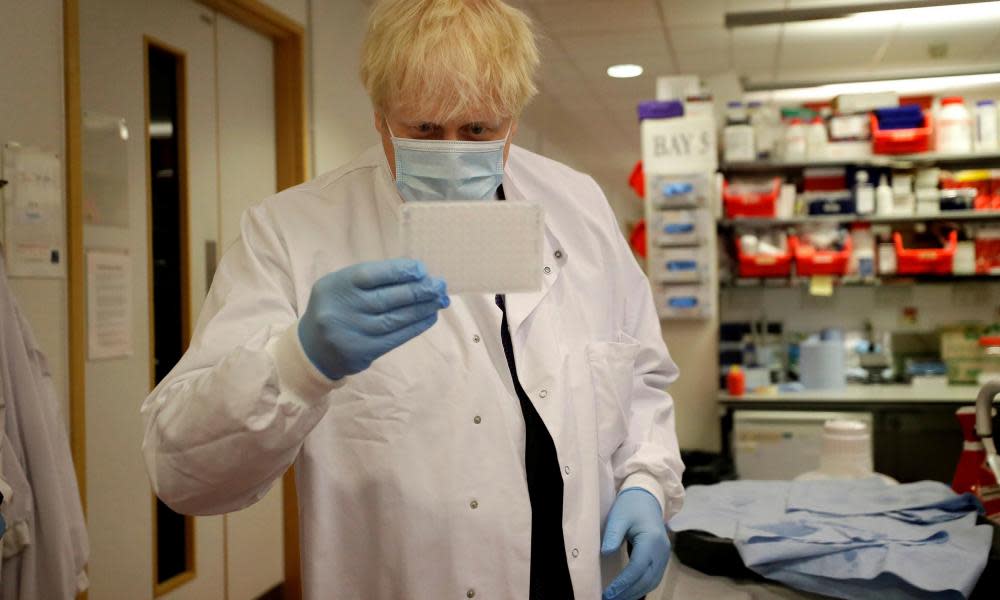The Guardian view on a second wave: Boris Johnson should be worried

We know that political classes in many countries, including Britain’s, can misjudge the mood of the times. So it would be wise not to read too much, too conclusively or too soon into the loud rumblings in the Conservative party about Boris Johnson and his government, and some of the media reaction to it. After all, it is only just over nine months since Mr Johnson won a crushing majority in the general election and the Tories remain ahead in almost all polls. This prime minister is not hanging on by his fingernails.
Nevertheless, rumblings – and sometimes more than that – there undoubtedly are. The Tory-supporting press that flashed warning signals to Mr Johnson every day this week is not making this new mood up. Three weeks ago, as MPs returned to Westminster after a summer of U-turns, Tory backbenchers launched some fierce criticism of the prime minister. Three weeks into the parliamentary session, the criticisms are increasing and they now come from a wider circle. Downing Street’s relations with Tory MPs were already poor because Dominic Cummings treats them with such disdain. No 10’s readiness to break international law in the Brexit process has made things worse. But the mishandling of Covid is at the heart of this, and that could clearly get a lot worse quite quickly. If that happens, it could have big political consequences.
Less than 24 hours after the World Health Organization warned of an alarming rise in cases across Europe, the prime minister himself confirmed that a second wave of infections is now on its way to Britain. This is a momentous turning point for families and communities across Britain and beyond. But it is momentous for the government too. This was most definitely not supposed to happen, let alone to happen so early in the autumn.
Instead the brakes have suddenly been slammed on the government’s return-to-normal boosterism. On Friday the health secretary, Matt Hancock, who generally gives a positive spin to events, instead gave an austere set of interviews on the latest figures and trends. New restrictions would come in for Lancashire, parts of the West Midlands and of West Yorkshire. “Circuit-breaking” forms of nationwide restrictions in England could be introduced within days. Mr Hancock pointedly refused to rule out a further full national lockdown.
This is a serious moment and serious stuff, Mr Hancock said. He is right. But the seriousness is not confined to the public health situation, central though that is. Its potential impact on Britain’s economy could be immense, forcing choices the chancellor would rather avoid in the upcoming budget. The political consequences would be immense too. Prime ministers can normally rely on a degree of latent public trust in a crisis. But if a second wave triggers a second lockdown, even if it is a patchwork of local ones, and if it is as disgracefully mishandled as the testing system continues to be, public patience could unravel and Mr Johnson could find himself facing the toughest political challenge of his prime ministership.
Mr Johnson is under pressure from Tories to make large changes in his government. Many would like a better cabinet. Others want to see the back of Mr Cummings too. But the real problem is Mr Johnson himself. Few would dispute that the challenges of Covid are immense and unprecedented. But Mr Johnson’s characteristic responses – over-promising and under-delivering, a slovenly relationship with details and facts, his tendency to avoid hard choices, and his readiness to do what pleases rather than what is right – threaten avoidable confusion at a vital time. At its worst it runs the risk of disabling the response to a second wave for which the government should have prepared far better when it had time to do so. If that happens, the mood in both the Tory party and the country really could become unforgiving, and Mr Johnson would deserve it.

 Yahoo News
Yahoo News 
